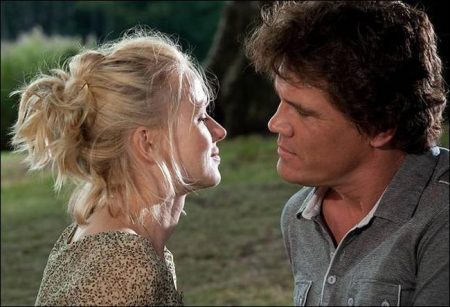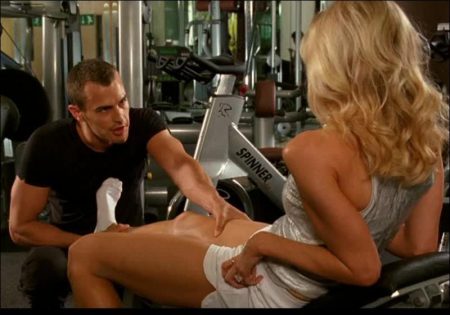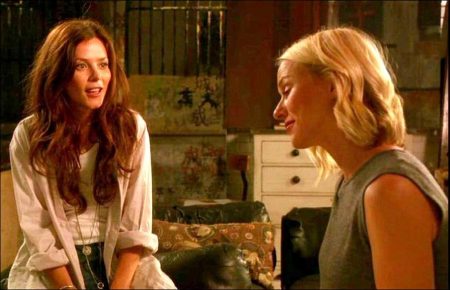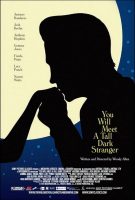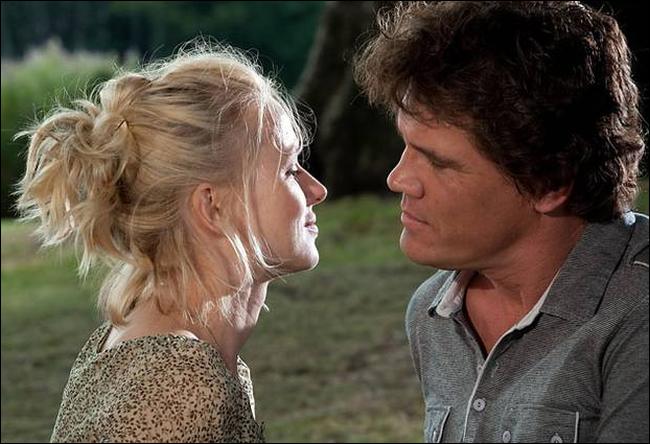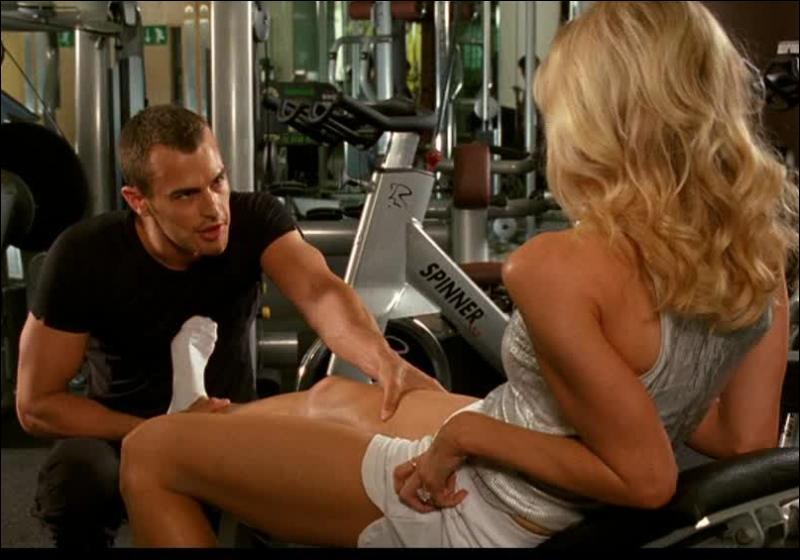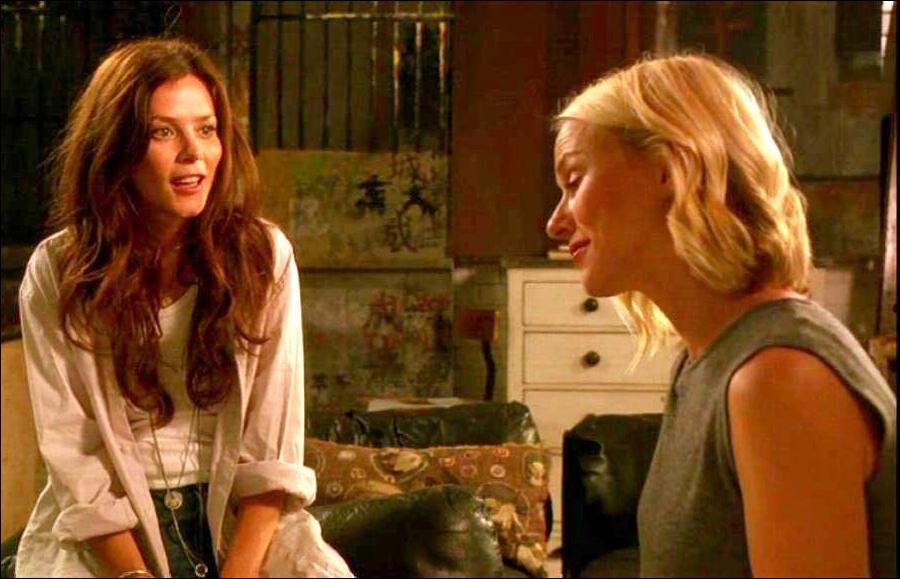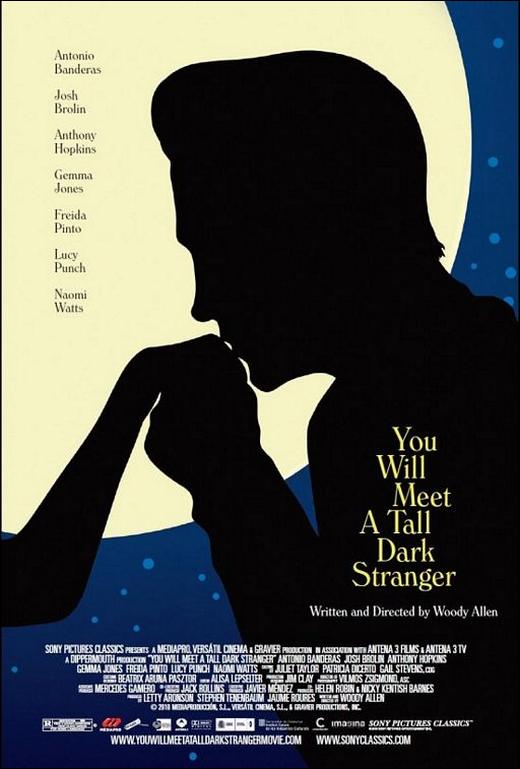Wooody Allen’s film follows a pair of married couples, Alfie (Anthoy Hopkins) and Helena (Gemma Jones), and their daughter Sally (Naomi Watts) and husband Roy (Josh Brolin), as their passions, ambitions, and anxieties lead them into trouble and out of their minds. After Alfie leaves Helena to pursue his lost youth and a free-spirited call girl named Charmaine (Lucy Punch), Helena abandons rationality and surrenders her life to the loopy advice of a charlatan fortune teller.
Unhappy in her marriage, Sally develops a crush on her handsome art gallery owner boss, Greg (Banderas), while Roy, a novelist nervously awaiting the response to his latest manuscript, becomes moonstruck over Dia (Freida Pinto), a mystery woman who catches his gaze through a nearby window.
A fortune teller and her predictions figure prominently in the story of You’ll Meet a Tall Dark Stranger, and so the title has an obvious literal meaning. But it also has a darker connotation, as Josh Brolin‘s character spells out:: “You will meet the same tall, dark stranger that we all eventually meet,” in other words, the grim reaper. It is the attempt to evade the inevitable that sets the story into motion, when Alfie Shepridge (Anthony Hopkins) wakes up in the middle of the night, realizes he only has a few years left.
“Alfie starts to get antsy,” says writer / director Woody Allen, “and wants to start eating health foods, and doesn‘t want to hear from his wife that he‘s not a young man anymore. He doesn‘t want to face up to that, so he gets rid of his wife, Helena (Gemma Jones), and embarks on a different life, catapulting everyone into different states of chaos.” Taking on the accoutrements of youth—a sports car, a health club membership, a flashy bachelor pad—Alfie convinces himself he can regain the bloom of his life by sheer willpower. “I think there is something about the male ego that blinds Alfie,” says Hopkins. “He literally goes out of his mind.”
Shattered after being abandoned byAlfie, Helena (Gemma Jones) grasps at straws. After a failed suicide attempt, she tries medicine and analysis to calm her spirits, but finds no relief until she latches onto the unlikely solution of visiting a fortune teller, Cristal (Pauline Collins). Hearing Cristal‘s cheerful predictions of her future, especially involving romance, brightens her spirits immediately. “Helena is an innocent,” says Jones, “she always is optimistic and she still believes there is love out there. She could have picked the other way and become really unhappy, but somehow she travels through it and comes out the other side.” Because she is able to delude herself, she survives.
Alfie and Helena‘s daughter, Sally (Naomi Watts), is also feeling strains in her marriage. Having married her novelist husband Roy (Josh Brolin) when he was at a high point after publishing a promising first novel, his subsequent inability to live up to his promise has rendered him irritable and unable to hold a job. Tired of subsidizing his artistic ambitions with her mother‘s money and her salary as the assistant to art gallery owner Greg Clemente (Antonio Banderas), Sally is anxious for the two on them to get on with their lives. “Sally‘s reached an age where she‘s hellbent on having a baby and can‘t get Roy on the same track as her,” says Watts.”So she becomes fixated on it as women in their late thirties do. She wants to make it work with Roy, but as she can‘t get him on board, she starts seeking the attention of someone else.”
As Roy turns out one failed book after another, it eats into his confidence.”Roy doesn‘t have sufficient talent to get beyond that first novel,” says Allen. “At first he didn‘t mind trying, but it‘s starting to occur to him that maybe he‘s a one book phenomenon, a flash in the pan, and this is a very unpleasant thought.” Weighted down by his anxiety, Roy procrastinates, laboring for seven years on his latest manuscript. “I don‘t think Roy needs to be a writer so much as to be a success, which is a very different thing,” says Brolin. “For him it‘s not about what interests him or inspires him, it‘s just that he wants to be perceived as brilliant, needs to be perceived as brilliant, because the perception he has of himself is very, very low at this point in his life.”
Sally encourages her mother‘s visits to Cristal, even though she knows the fortune teller is a fraud, and is making Helena increasingly delusional. As an only child whose mother has tried to kill herself, Sally needs to take care of her mother, and it is a very heavy burden. “She‘s thinks, what the hell, nothing else has worked and this guru is keeping her calm, keeping her from being suicidal,” says Allen. “She doesn‘t want to upset the apple cart and have her mother take sleeping pills again or be distraught all the time.” Jones thinks that Helena‘s personality made her especially susceptible to Cristal‘s chicanery: “I think she is a bit flakey. I think we all get a bit nuts as we get older, or our characteristics become eccentricities. Helena probably was a flighty girl and hasn‘t really grown up in some senses.” Helena grew up religious but it failed her.
Taking his own side-trip from reality, Alfie falls head over heels for Charmaine (Lucy Punch), a capricious call girl half his age. “He makes a complete idiot of himself for this woman because she is glamorous and invigorates his self-esteem or what little self esteem he has,” says Hopkins. As inappropriate for Alfie as Charmaine is, it‘s not hard to see how she could, in Roy‘s words, “put a charge in his batteries.” “Charmaine is someone who always wants to have a good time, to be laughing, dancing, up for life and whatever‘s going on,” says Punch. “She‘s almost like a bird, she never lands, fluttering from one thing to the next. She is also very sensual and sexual, led by her loins.”
His head spinning from Charmaine‘s company, Archie proposes to her, disregarding her taste for luxurious items he can‘t afford. “He thinks, “Oh, I might as well marry the girl—I love her,‘” says Hopkins. “The girl has reestablished his manhood and youth and he just wants to go all out and try to extend things.” And Charmaine says yes. “I definitely think she‘s fond of him, although I‘m not sure if she‘s in love with him,” says Punch. “Definitely the fact that he had money was attractive; although I‘m sure she had many wealthy suitors before. I think it was on a whim—I don‘t think she gave it a lot of thought. I don‘t think she ever had it in her mind that it was forever, nor does she ever think about the consequences of any of her actions.”
Frustrated in her relationship with Roy, Sally finds herself increasingly drawn to her boss. In every way, Greg is the polar opposite of her husband: successful instead of struggling; calm instead of moody; capable to provide the kind of life she‘s yearning for—gifts, travel, trips to the opera, maybe even a child. “I think she wants to make it with Roy,” says Watts, “but there is a massive hole for her that isn‘t being fulfilled. Greg represents all the surface things she thinks she‘s looking for.”
As she starts to fall for Greg, it‘s hard for her to tell if he returns her feelings. Although he usually treats her in a strictly professional manner, he sometimes sends out ambiguous signals. For example, he takes her to a jewelry store and has her try on earrings to help him select a pair for his wife. “He looks at her, measures her, and makes this move that may just destroy her heart if she has a crush on him,” says Banderas. “It‘s innocent for him, but for her it means something. I think he is a little bit blind and doesn‘t know the effect he can produce on her by doing certain things.”
And for her part, Sally is waiting for him to make the first move. “She‘s reserved and wants to know that she‘s wanted before she‘s willing to put herself out on the line, as for example in a charged scene where they sit in a car after going to the opera and drinks together. ” She thinks he‘s thinking about her, but they are out of sync, and it is really awkward,” says Watts. “I think that Greg may be thinking, ‘Wow! She‘s prettier than I thought!” says Banderas. ” Now that he‘s looking at her in a different context she‘s quite interesting, and that comes as a surprise to him. But it doesn‘t go anywhere.”
Stressing out in his room, straining to finish his novel, Roy becomes transfixed by a mysterious woman dressed in red who plays her guitar in the window across his courtyard. “He‘s having a tough time,” says Allen, “and when he sees this breath of fresh air across the yard, he becomes intrigued with her and eventually she becomes a seductive fantasy for him.” Roy is by nature a “grass is always greener on the other side” type of person, perpetually dissatisfied with what he has, and drawn to what is beyond his reach; he becomes even more interested in the woman when he discovers that she‘s involved with another man. “Roy feels lost,” says Brolin, “and when he hears her playing her guitar, and sees the youth and beauty that she represents, he thinks that by attaining that, suddenly he can start over, or he can pretend like everything that‘s happened that‘s been painful in his past can be erased by creating something new.”
Ultimately, Josh takes the plunge and invites the woman, whose name is Dia (Freida Pinto, star of SLUMDOG MILLIONAIRE), for lunch. While Dia is engaged to be married, she accepts his invitation. “I don‘t think that Dia went out with Roy with the intention of having an affair, but just for the prospect of meeting someone new and having a conversation,” says Pinto. “But she is a confused girl, trying to figure out what she wants in life, and when he gives her such flattering compliments, she is definitely lured into wanting to know what might be. And somehow she realizes that what she has is not what she wants.” She also has fantasies of being a writer.
While the characters in YOU WILL MEET A TALL DARK STRANGER don‘t manage their problems in the most productive ways, Roy crosses a line that the others don‘t. “Roy is the darkest, most complicated character,” says Allen. “He’s dissatisfied with himself, he‘s insecure, his relationship with Sally is deteriorating and he‘s drawn to Dia, so he‘s willing to make a bad moral choice, in the hopes that it will straighten his life out in some way.” Brolin doesn‘t think that Roy struggled very hard with his decision. “I don‘t think there was even a second thought that went into it,” he says. “‘I can use this for me, he‘s dead, so why not?‘ Which is why I think the consequences are so severe.”
As is often the case with Woody Allen‘s movies, YOU WILL MEET A TALL DARK STRANGER features a cast of prestigious and well-known actors as well as some talented newcomers. “It always surprises me how good they can be,” says Allen. “I don‘t give them any rehearsal. Most of them ask me no questions about the character or about the script. They just come in and do it, sometimes on the first take or two, and then we move on.” In fact, Allen hadn‘t even met Naomi Watts before she arrived on the set, and her first scene was one of the most emotional ones she had to play in the movie. “She came in that morning, said ‘Hello,‘ and I said ‘Hello,‘ and she started acting like a car that starts in third, without bothering to go to first or second,” says Allen. “She was great from the moment she opened her mouth. I‘d never seen anything like it before: she walks in cold, and instantly calls upon her acting talent and does it great straightaway.”
Watts remembers it slightly differently: “It was pretty nerve-wracking—and I was totally starstruck by Woody!” Allen has high praise for Anthony Hopkins: “He brings a lifetime of superior acting: he can just walk in and show up on screen and automatically he just has something that’s built in. he’s such a forceful and tremendous actor that you just get overwhelmed by him all the time. He‘s one of those people who‘s lucky in life, he just has it.” Hopkins said that Allen gave him a lot of confidence: “I felt like he trusted me for what I can do. He didn‘t over-direct me. At the same time, he didn‘t let me get away with anything. He‘s very demanding and he wanted the best out of me and that‘s just great. And he was very upbeat when I got it right!”
When Allen was casting the role of Helena, Gemma Jones‘ name kept coming up. “When I described the character, everyone said to me, ‘you mean Gemma Jones,‘” he says. “We looked at many people for the role, and not only is she a wonderful actress, she just seemed a natural for this part, a part that really fit her like a glove.” Says Jones: “It was quite tricky to see how to play Helena. I had to play her ‘for real,‘ as it were, and not be seduced into taking it into farce, although the situations are fairly farcical. And we had quite a problem deciding how she should look. And then Woody said, ‘think out of date clothes and hats,‘ and it all sort of fitted into place, the costume and the sensibility of someone who is fragile. And that‘s what I hung my performance on.” Allen has the highest praise for Jones‘s work. “She came in and knew the character and what to do, and performed it immaculately, as beautifully as any author could want one of his characters played.”
Compared to the other actors, Josh Brolin had numerous ideas and questions for Allen. “The thought of playing any character that‘s anywhere ?normal,‘ whatever that is, always frightens me,” says Brolin. “So my suggestion to Woody at the beginning was that Roy be in a wheelchair. I wrote him a three page email about why I thought it was necessary, and I think I mentioned a Yugoslavian accent at one point. And he wrote me back an email response that just said ‘no.‘ I laughed a lot—I‘m still laughing. That was the beginning of our friendship.” Says Allen: “Some actors have no questions, Josh has many, he really gets into it—he asked me about his haircut, how he should walk, dress, conduct himself, and that‘s great, it works for him. I could only make one or two little suggestions here and there, but his answers were always better than mine. He thinks it emerged from a dialogue with me, but it’s really him. What I did keep telling him was, ‘you‘re a great actor, use your instinct, just trust it and it will make you great again.‘”
The role of Greg Clemente was a departure from the kind of roles Antonio Banderas normally plays. “Normally, especially in America, I have been called to play characters that are bigger than life, heroic characters in epic movies like ZORRO and DESPERADO. I never play just a sweet, normal, well intentioned person. It‘s kind of new for me, actually.” But the heartthrob quality that Banderas displayed in those epic parts made him ideal for this quieter kind of role.
Says Allen: “I needed someone who would be believable as an international art dealer, that was successful, and Antonio had everything I wanted—the stature, the elegance, the good looks that would make a woman fall for him, and he‘s a wonderful actor.” While Greg might seem the one character in the film with his feet planted firmly on the ground, he also has some issues, albeit more subtle ones. “He married a woman who was bipolar, not a good choice, and he‘s had a tough time with her, and he‘s switched over now to a woman who has had a problem with dope and alcohol,” says Allen. “He‘d probably be better off with Sally, but instead he picks her friend who has not had such a completely healthy past.”
While Allen provided Banderas with a copy of the script when he arrived on location, he chose to not read anything except for the scenes he was in. “I asked Woody if he wanted me to read it and he said it was up to me. If I didn‘t want to read it, I could do my part independently of what the story is all about, and everyone is just playing their parts. Because it was my first time with Woody and it was a different experience than I had ever had before, I decided not to.”
As Dia is an enigmatic figure for Roy, a screen upon which he projects his fantasies, Allen doesn‘t let the audience get a good look at her until Roy does. For the first half of the film; she‘s visible only from a distance, through the window. “When you finally do see her, it bowls you over—she is so remarkably beautiful,” says Allen. “She‘s probably had a more complex life because of her unusual beauty.” Pinto found it liberating to play such a mysterious character. “It allows you to have more freedom,” she says. “Not many people will question you, saying, ?you shouldn‘t have done that, it‘s out of character.‘ Still it was a bit of a challenge, as it was only my third film, and here I was working with Woody and Josh. Everyone was so encouraging, though, and I got over it in a few days.”
As the original name of her character was the same as her character in SLUMDOG MILLIONAIRE, Pinto asked Allen if he would change her character‘s name. When she felt the second name he picked wasn‘t appropriate for her character‘s class, she asked if she could choose a name herself, and he was happy to oblige her. Pinto spent a few days thinking about it. “It may not seem that important, but I felt like she needed a name that felt like the character,” she says. “Dia didn‘t come to me easily, I had to think about it. It means ‘day‘ in Spanish and Portuguese, and in Hindi it means’light,‘ both having to do with lightness.”
The final character to be cast was Lucy Punch as Charmaine. “We looked for a long time, and went through every conceivable permutation, known and unknown, but in the end, Lucy won this part by sheer talent,” says Allen. “She has a great look, she‘s very funny, she‘s a wonderful actress, has a tremendous personality, and she‘s 100% alive on the screen.” Says Punch: ” I only read a couple of the scenes in my first audition, but when I came back to do more, I don‘t know why, I just felt like I knew her, just thought I knew how to do it. I decided that anything that Charmaine said about herself was probably untrue, or she made it up on the spot. She just keeps reinventing herself and changing her story. There‘s a lot that‘s unlikeable in her, but I really connected with her love of life and fun and her vivaciousness.” Punch calls the day she got the role the most exciting day of her life. “I was screaming, running around the house. I rang up my mother, everyone was screaming. Then a half hour later, I locked myself out of my apartment.”
Banderas says that before he came to location, he got a letter from Allen (which he has now framed) telling him that he could feel free to change dialogue if it made him more comfortable, including dropping or adding lines. All the actors mention Allen‘s receptiveness to improvisation. “Charmaine speaks in a certain type of way and Woody let me improvise a lot, and let me try different lines and different jokes,” says Punch. “A couple of times he would say, ‘stop being funny.‘ He likes things to be very real and I guess I was doing something a little contrived. But generally he let me do what I wanted.” Says Pinto: “The advice he gave me was to not act for the camera. He detests actors acting for the camera—he wants you to be more natural.” Allen‘s style of shooting scenes in one long take was both exciting and challenging for the actors. “You could be doing a six-page scene,” says Brolin, “and you walk in and figure out the blocking in about ten minutes, and you may walk into six different rooms, so the blocking is extremely complicated. You have fifteen minutes to incorporate it into your mind, as they‘re setting up the lighting, and he gives you a few takes to do it in, when it‘s only one shot.
So you definitely have to be focused and present.” Says Watts: “I always wondered why people end up speaking or sounding like him in his movies,” she says. “A lot of that has to do with the fact that you‘re kind of on edge in these scenes. You stumble through your dialogue, like, ‘uh-uh-oh I gotta pick up the glass! Now I‘ve gotta go out there and get another drink!‘ But that‘s what I love about him. He gives you these brilliant words, but he‘s not so profoundly tied to them. When you do the scene that way, and you‘re searching for words, and you‘re making them your own.”
Compared to all the characters in the story, Helena appears the most serene. Living in her happy cloud, she even finds a soul-mate with an equally preposterous disregard for reality. “Helena is crazier than everybody else,” says Allen, “and in this tragic life that we all live, you can find happiness, provided that you‘re nuts, if you buy into fairy tale fantasies, and black out reality.” This notion isn‘t limited to people as irrational as Helena. “I think everyone finds his own way of denying and rationalizing the awful human predicament, says Allen. “That‘s how people get through life: by constantly denying reality, constantly buying into illusions of artistic immortality, of meaning to the universe, an afterlife, all kinds of illusions.”
Hopkins feels this idea is exemplified by Alfie‘s intense need to have a child that is his own. “He wants someone to carry on and immortalize him or eternalize him,” he says. “Whatever we do to bolster our lives, to ward off the inevitable — fame, fortune, wealth, the red carpets, or whatever it is—is to try to perpetuate immortality, to ward off the horror because that is what we all feel deep down inside: the mystery of life and death.”
The film opens and closes with a line taken from “Macbeth”: “a tale full of sound and fury, signifying nothing.” Allen explains: “All these characters are running around trying to find meaning in their lives, and find ambitions and successes and love. They‘re all running around, bumping into each other, hurting each other, getting hurt, making mistakes—a constant chaos. But in the end, after a hundred years, everybody on earth along with them will be completely gone, and after another hundred years, there will be a new set of people. And after all of the ambitions, and aspirations, and the plagiarism and adultery, what once was so meaningful won‘t mean a thing. Many years from now the sun burns out and the earth is gone, and many years after that the entire universe is gone. Even if you could find a pill that makes you live forever, that forever is still a finite number, because nothing is forever. It‘s all sound and fury, and in the end it means nothing.”
Considering the bleakness of his vision, why does Allen continue to make films? “It‘s a distraction that has its own little challenges and consequently keeps my mind off morbid thoughts.”
You’ll Meet a Tall Dark Stranger (2010)
Directed by: Woody Allen
Starring: Naomi Watts, Gemma Jones, Josh Brolin, Anthony Hopkins, Antonio Banderas, Freida Pinto, Eleanor Gecks, Fenella Woolgar, Ewen Bremner, Christian McKay, Jonathan Ryland, Philip Glenister
Screenplay by: Woody Allen
Production Design by: Jim Clay
Cinematography by: Vilmos Zsigmond
Film Editing by: Alisa Lepselter
Costume Design by: Beatrix Aruna
Set Decoration by: John Bush, Fabiano De Souza Ramos
Art Direction by: Dominic Masters
MPAA Rating: R for some language.
Distributed by: Sony Pictures Classics
Release Date: September 22, 2010


